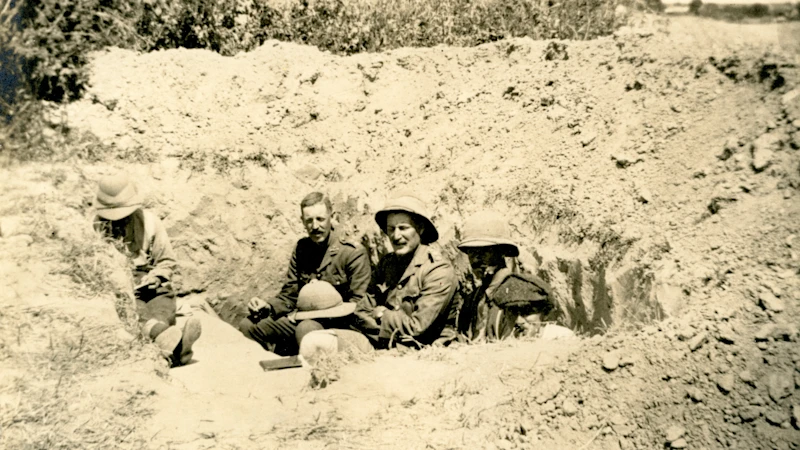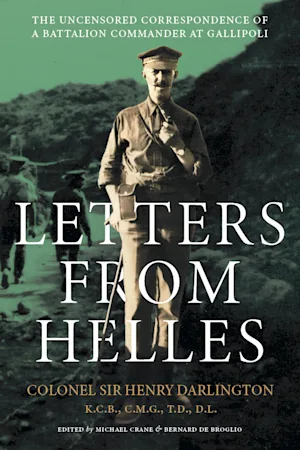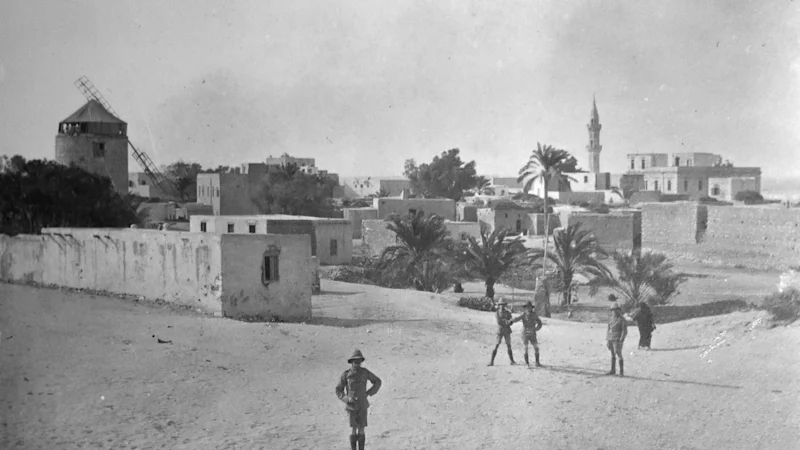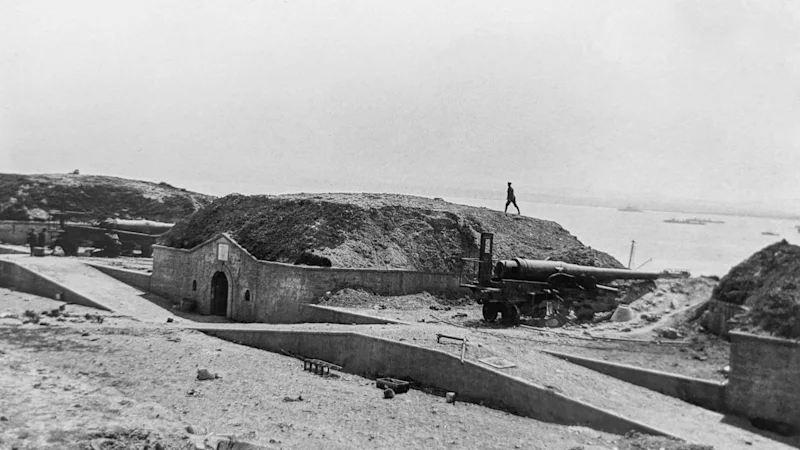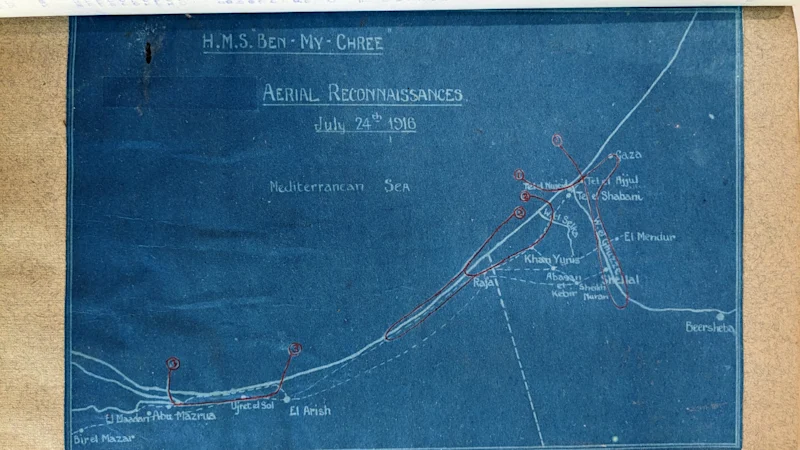A new edition of Letters From Helles brings a rare and valuable first-hand account of the Gallipoli campaign back into publication. The book, originally released in 1936, contains the personal correspondence of Colonel Sir Henry Darlington, who commanded the 1/5th Battalion, Manchester Regiment. As a historian who has deeply researched the Gallipoli campaign through countless personal accounts, reviewer Jim Grundy finds Darlington’s letters offer a profound insight into the immense strain and daily existence of a commander on the peninsula.
Letters From Helles. The Uncensored Correspondence of a Battalion Commander at Gallipoli by Colonel Sir Henry Darlington.
Edited by Michael Crane and Bernard de Broglio.
Little Gully Publishing, 2025, 277 pages.
Softback.
ISBN: 978-1-7640773-2-3
By the time Colonel Sir Henry Darlington was evacuated at the end of September 1915 he was the last one of the 42nd (East Lancashire) Division’s original battalion commanders left on the peninsula. After his departure his men, 1/5th Battalion Manchester Regiment, depleted by death, wounds and sickness, formed a composite unit with 1/6th Manchesters.
Originally published in 1936, Darlington's “Letters From Helles,” letters he sent to his wife, is a rare tome today — most copies having been destroyed by the Luftwaffe in 1940. They give us the story he told those at home about his journey to Egypt in September 1914, and his service there before landing at Gallipoli in May 1915.
After meeting one of Darlington’s grandsons, who contributes a foreword to this new edition, Little Gully Publishing has reproduced the original text but have added a biography of Darlington, mini-biographies of those he mentioned and a timeline setting out the battalion's service at Helles. The work is extensively illustrated throughout with Darlington's own photographs taken on the peninsula. They alone are a fantastic record of the campaign.
Sir Ian Hamilton wrote the preface to the original work (which is also reproduced now). Despite writing that he “must not spoil my preface by making it a vehicle for publishing my own thoughts,” he could not resist doing so. More usefully, he tells us, “even now when we know that they [Darlington's letters] only gave one half of the story they will do us all good to peruse.” [1] And this leads us to consider the information Darlington decided to share and what he withheld; how he tried to balance reflecting reality while providing reassurance that all was well.
An early example concerns the voyage from England to Egypt. Darlington told his wife that most of the officers were sick crossing Biscay. C.S.M. Walter Spencer, who Darlington had served with in South Africa (and whose death on the peninsula in May 1915 he recorded in a letter) told us rather more.
“Practically all my Company were placed hors de combat for a day or two. Just fancy having two full days tossed about mid-ocean. One of my sergeants (George Beazant) wanted the ship to go down. Of course, he wasn’t the only one who said this.” [2]
Similarly, while Darlington reported the death of one officer, another of his officers, Second Lieutenant Eric Burrows, took a very different approach.
“Poor Freddy Brown [3] was killed. It was a terrible blow to every one... Our company has had six killed and altogether about 15 wounded. A man in my platoon was shot in the neck yesterday morning and died almost immediately. Mercifully he didn't suffer at all but was unconscious all the time. It was all very terrible for us. I have never come face to face with death like that in my life, and he was one of the best men I had... The 7th Battalion were sent out last night to dig yet another line and were rather badly cut-up, three officers being wounded, and the incessant cry of 'Stretcher-bearers!' was appalling.” [4]
After the near destruction of 4th Battalion Worcestershire Regiment on 6th August 1915, Darlington described the aftermath.
“I went up to the fir wood near here yesterday with my glasses to have a look at the battlefield, and it is a sight, our Brigade and the Worcesters’ dead are lying about in whole platoons.” [5]
While he often referred to bad smells, it was never as explicitly stated as Second Lieutenant Arthur Behrend, 1/4th Battalion East Lancashire Regiment, who described a patrol into no man's land at Cape Helles on 13th May 1915.
“The smell was now overpowering, and I raised myself on hands and knees to see if I could find the cause. I did find it, and the shock took my breath away. A dozen men in fighting kit were lying, mostly face downwards, in an orderly row. A few yards in front of them I saw an officer and a sergeant, and, a pace or two back, a bugler. They were Worcesters — I recognised the cap badge — and it was clear they had been caught by machine-gun fire while advancing in open order. It was also clear they had been lying out there among the poppies and tall daisies for a week or more, a pitiful tribute to their regimental motto ‘Firm’.” [6]
But, of course, Behrend was not writing to a letter to his wife. Darlington’s reticence is perfectly understandable but, as the struggle dragged on, he could not hide his fears and frustrations. His letters show how he alternated between anger at the shortage of every military necessity to insisting that, nevertheless, the Turks would collapse suddenly. And as his battalion was hollowed out, he bemoaned the quality of the reinforcements being sent to him.
“Somehow drafts seem mere bullet food nowadays.” [7]
“I call it damned impertinence to try and quell the Turk with the riff raff we have got here just now. I only hope we are not trying to quell the Hun with the same muck.” [8]
In the background to all this was the deteriorating health of everyone on the peninsula. By August/September 1915, 78% were suffering from diseases such as dysentery and jaundice; 64% had septic sores; and around half of those who had been there longest were displaying symptoms of heart disease. [9]
Darlington could not hide that septic sores on his hands were causing him problems, as it affected his handwriting. But his health, generally, was worsening. Shortly before he finally left Gallipoli, he wrote:
“I am slightly off colour to-day... No symptoms, but just what the old hands get here, a general feeling of being off colour and slackness.” [10]
What you will not find here are detailed descriptions of fighting. But you will understand what it was like to simply exist at Helles, to try to keep going; of the stress that even a more guarded correspondent could not fail to show. Overall, it is an excellent insight into the life of a battalion commander (and temporary brigade commander) at Gallipoli. There's much more to be said about it but that can be resolved by reading the book.
Highly recommended.
Jim Grundy.
[1] Hamilton quoted in Crane, Michael & de Broglio (Eds.), “Letters From Helles. The Uncensored Correspondence of a Battalion Commander at Gallipoli,” p. 6, Little Gully Publishing (Sydney) 2025.
[2] ‘Leigh Chronicle and Weekly District Advertiser,’ 2nd October 1914. Also p. 76, Alive With Death.
[3] Captain Frederick Seddon Brown, 1/5th Battalion Manchester Regiment, was killed in action on 26th May 1915. Buried in Lancashire Landing Cemetery, he was the 31 year-old son of James and Helena Brown, of Mere Oaks, Standish-cum-Langtree, near Wigan, Lancashire.
[4] ‘The Wigan Examiner,’ 19th June 1915.
[5] Crane & de Broglio (Eds.), “Letters From Helles,” p. 94.
[6] Behrend, Arthur, “Make Me a Soldier. A Platoon Commander in Gallipoli,” pp. 74-75, Eyre & Spottiswoode (London) 1961.
[7] Crane & de Broglio (Eds.), “Letters From Helles,” p. 104.
[8] Crane & de Broglio (Eds.), “Letters From Helles,” pp. 119-121.
[9] MacPherson, Major-General Sir W. G. & Mitchell, Major T. J., “History of the Great War Based on Official Documents. Medical Services, “ Vol. 4, p. 58, H.M.S.O. (London) 1921.
[10] Crane & de Broglio (Eds.), “Letters From Helles,” p. 134.
